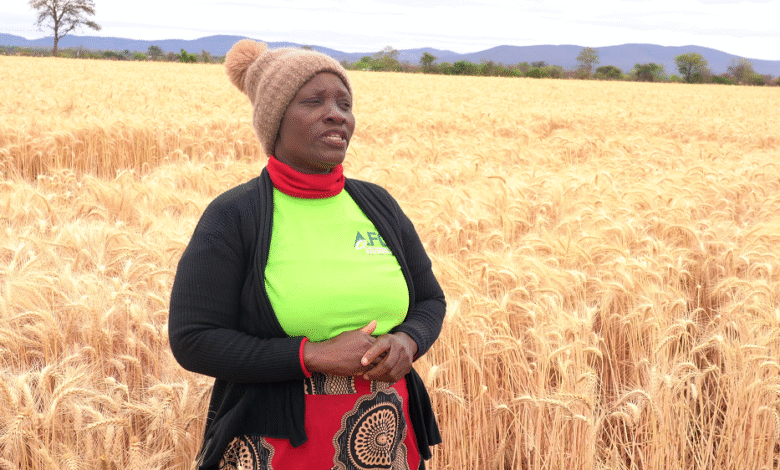Widow’s inspiring story of overcoming poverty through FAO-AfDB loan facility support program

Masvingo, Zimbabwe – For 51-year-old widow Yeukai Dzimbanhete Mushonhiwa, life was a daily struggle against poverty and hardship. After her husband passed away in 2016, with no means to afford their school fees, she was left to care for her three children, ranging from primary to college going age.
“We were living in abject poverty. I was not in a position to send my children to school. I could not afford the school fees,” Yeukai recounted. With no income from her small plot at Mushandike Irrigation Scheme, due to drought and lack of resources, she was forced to rely on handouts to survive.
“It was difficult for me, to go to the field, I did not have draught power to plough the field. I didn’t have money to buy farming inputs. So I would go for any kind of seed, Yeukai said.
That all changed when Yeukai was introduced to the AFC loan facility, a revolving loan scheme supported by the Food and Agriculture Organization of the United Nation (FAO) and the African Development Bank (AfDB).
With USD 25 million funding from the AfDB in partnership with AFC Land and Development Bank and the Government of Zimbabwe through the Ministry of Lands, Agriculture, Fisheries, Water, and Rural Development (MLAFWRD), FAO is implementing the Zimbabwe Emergency Food Production Facility (ZEFPF). A project designed to support farmers and the government to raise food production in the short term and build food security resilience over the medium to long term.
“The ZEFPF project particularly focuses on increasing cereal and oil seed production, fertilizer distribution and to provide policy support towards these actions,” Assistant FAO Representative (AFAOR) – Programmes, Tendai Munyokoveri, said.
“We provided a grant of about 25 million United States dollars to the Zimbabwean government, to support smallholder farmers to access certified seeds and fertilizers,” added AfDB Country Manager for Zimbabwe, Moono Mupotola.
The power of collective action
Yeukai joined forces with 18 other smallholder farmers, to access the seed revolving fund loan facility which they used to purchase good quality seeds, fertilizers and farming equipment.
“After we got our first loan in 2023, we planted wheat. We are 19 members, and we planted together,” Yeukai said. The collective approach allowed the group to pool their resources and work the land more efficiently. All proceeds from their harvests were then deposited directly into their AFC bank account. This arrangement allowed the group to meet their loan repayment obligations, while allowing them to retain part of the proceeds to meet their farming and household needs.
“As a result of the collective loan repayment arrangement we made as a group, we were spared from AFC chasing us in our homes in order to recover the loans. We are still working as a group.” Yeukai explained. “In our group there is no individualism, the plough belongs to all of us, if it is a scotch cart it belongs to all of us, we are so thankful for this,” she added. This sense of shared responsibility and community ownership has been key to the group’s success.
Beyond the tangible benefits of increased yields and income, Yeukai has also witnessed profound changes in her family’s wellbeing. “We are also seeing transformation in our health, in our children’s lives and homesteads, because we now have other projects that we are doing because of the loans that we are getting,” she said.
With her children now able to attend school, and the family’s basic needs met, Yeukai is filled with gratitude for the support that has turned her life around. “We used to be beggars. We didn’t have anything. We were just people. But through the Government of Zimbabwe, AFC and now FAO and AFDB we are now prosperous,” Yeukai said.
Yeukai’s story is a testament to the power of collective action and targeted interventions to empower marginalized communities. Her journey from poverty to prosperity serves as an inspiration to others facing similar challenges across Zimbabwe.
“What we are seeing is that in the midst of climate change, there are farmers with the capacity to deliver, with the capacity to produce for us to enhance food security in the country. As FAO, we are ready to support such farmers, and we will continue, with partners like AfDB and AFC, to support Zimbabwe with other financial and technical assistance,” said Tendai.
During the 2023 winter wheat loan cycle 1584 farmers received support and 37 940 tons of wheat were harvested. For the 2024 winter wheat production, 1766 farmers nationwide benefited from the seed revolving fund enabling them to have access to certified seeds and fertilizers. “A prerequisite for better crop production,” added ZEFPF project coordinator Zwelo Ndebele.
Ten (10) percent of farmers that benefitted from the 2024 winter wheat cycle of the seed revolving fund are at Mushandike Irrigation Scheme. “We are grateful for the great work that that is being done by farmers on the ground. We are witnessing a good crop and expecting a good harvest during this farming season,” said Tendai in appreciation of how the tripartite partnership between FAO, AfDB and the Government of Zimbabwe was helping, transform agricultural production of smallholder farmers at Mushandike Irrigation Scheme.
Source link
